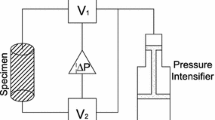Abstract
The seepage evolution characteristic of rock materials is very significant for the stability and safety of rock engineering. In this research, triaxial compression and water seepage tests were carried out on sandstone specimens. Based on the experimental results, the relationship between permeability and deformation is analyzed in detail. The results show that the permeability decreases with the increase of deviatoric stress at the initial compaction and elastic deformation stages, while the permeability increases with the increase of deviatoric stress at the stages of yield deformation, stress sharp drop and residual stress. The permeability evolution in rock is inherently coupled with the deformation, damage and failure process. It is highly related to the initiation and propagation of cracks. The compressive strength is found to decrease when the pore water pressure is higher and to increase when the confining pressure is higher.



Similar content being viewed by others
References
Alam AKMB, Niioka M, Fujii Y et al (2014) Effects of confining pressure on the permeability of three rock types under compression. Int J Rock Mech Min Sci 65:49–61
Alam AKMB, Fujii Y, Fukuda D et al (2015) Fractured rock permeability as a function of temperature and confining pressure. Pure Appl Geophys 172(10):2871–2889
Bäckblom G, Martin CD (1999) Recent experiments in hard rocks to study the excavation response: implications for the performance of a nuclear waste geological repository. Tunn Undergr Space Technol 14(3):377–394
Fujii Y, Ishijima Y, Ichihara Y et al (2011) Mechanical properties of abandoned and closed roadways in the Kushiro Coal Mine, Japan. Int J Rock Mech Min Sci 48(4):585–596
Heiland J (2003) Laboratory testing of coupled hydro-mechanical processes during rock deformation. Hydrogeol J 11(1):122–141
Kwon S, Cho WJ (2008) The influence of an excavation damaged zone on the thermal-mechanical and hydro-mechanical behaviors of an underground excavation. Eng Geol 101(3):110–123
Neuzil CE (2003) Hydromechanical coupling in geologic processes. Hydrogeol J 11(1):41–83
Rutqvist J, Stephansson O (2003) The role of hydromechanical coupling in fractured rock engineering. Hydrogeol J 11(1):7–40
Sato T, Kikuchi T, Sugihara K (2000) In-situ experiments on an excavation disturbed zone induced by mechanical excavation in Neogene sedimentary rock at Tono mine, central Japan. Eng Geol 56(1):97–108
Tsang CF, Bernier F, Davies C (2005) Geohydromechanical processes in the Excavation Damaged Zone in crystalline rock, rock salt, and indurated and plastic clays—in the context of radioactive waste disposal. Int J Rock Mech Min Sci 42(1):109–125
Wang H, Xu W, Shao J et al (2014a) The gas permeability properties of low-permeability rock in the process of triaxial compression test. Mater Lett 116:386–388
Wang HL, Xu WY, Shao JF (2014b) Experimental researches on hydro-mechanical properties of altered rock under confining pressures. Rock Mech Rock Eng 47(2):485–493
Yang D, Billiotte J, Su K (2010) Characterization of the hydromechanical behavior of argillaceous rocks with effective gas permeability under deviatoric stress. Eng Geol 114(3):116–122
Yao C, Jiang QH, Shao JF (2015) A numerical analysis of permeability evolution in rocks with multiple fractures. Transp Porous Media 108(2):289–311
Yin G, Jiang C, Wang JG et al (2013) Combined effect of stress, pore pressure and temperature on methane permeability in anthracite coal: an experimental study. Transp Porous Media 100(1):1–16
Zhang Y, Shao JF, Xu WY et al (2014) Stability analysis of a large landslide in hydropower engineering. Nat Hazards 70(1):527–548
Zhang Y, Shao JF, Xu WY et al (2015) Creep behaviour and permeability evolution of cataclastic sandstone in triaxial rheological tests. Eur J Environ Civil Eng 19(4):496–519
Author information
Authors and Affiliations
Corresponding author
Rights and permissions
About this article
Cite this article
Chen, Y. Experimental Study of the Stress Dependence of the Permeability of Rock. Geotech Geol Eng 34, 1571–1575 (2016). https://doi.org/10.1007/s10706-016-0066-y
Received:
Accepted:
Published:
Issue Date:
DOI: https://doi.org/10.1007/s10706-016-0066-y




